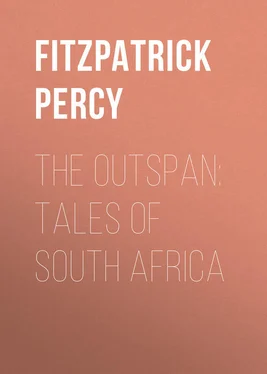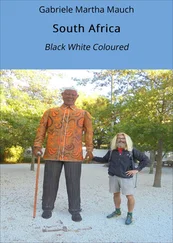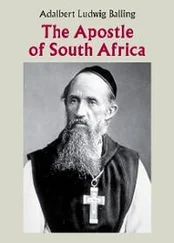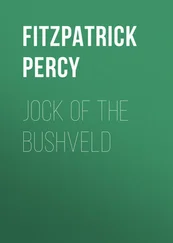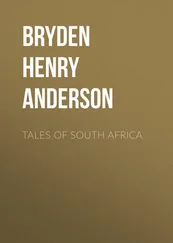Percy Fitzpatrick - The Outspan - Tales of South Africa
Здесь есть возможность читать онлайн «Percy Fitzpatrick - The Outspan - Tales of South Africa» — ознакомительный отрывок электронной книги совершенно бесплатно, а после прочтения отрывка купить полную версию. В некоторых случаях можно слушать аудио, скачать через торрент в формате fb2 и присутствует краткое содержание. Жанр: foreign_antique, foreign_prose, short_story, на английском языке. Описание произведения, (предисловие) а так же отзывы посетителей доступны на портале библиотеки ЛибКат.
- Название:The Outspan: Tales of South Africa
- Автор:
- Жанр:
- Год:неизвестен
- ISBN:нет данных
- Рейтинг книги:3 / 5. Голосов: 1
-
Избранное:Добавить в избранное
- Отзывы:
-
Ваша оценка:
- 60
- 1
- 2
- 3
- 4
- 5
The Outspan: Tales of South Africa: краткое содержание, описание и аннотация
Предлагаем к чтению аннотацию, описание, краткое содержание или предисловие (зависит от того, что написал сам автор книги «The Outspan: Tales of South Africa»). Если вы не нашли необходимую информацию о книге — напишите в комментариях, мы постараемся отыскать её.
The Outspan: Tales of South Africa — читать онлайн ознакомительный отрывок
Ниже представлен текст книги, разбитый по страницам. Система сохранения места последней прочитанной страницы, позволяет с удобством читать онлайн бесплатно книгу «The Outspan: Tales of South Africa», без необходимости каждый раз заново искать на чём Вы остановились. Поставьте закладку, и сможете в любой момент перейти на страницу, на которой закончили чтение.
Интервал:
Закладка:
Percy Fitzpatrick
The Outspan: Tales of South Africa
Chapter One
“There is no art in the Telling that can equal the consummate art of the Happening!”
It was a remark dropped by a forgotten someone in a prospector’s hut one night, years and years ago, when we had exhausted snakes and hunting, lucky strikes and escapes, and had got away into coincidences. One of the party had been telling us an experience of his. He was introduced on the day he arrived to a man well known on the fields. It seemed quite impossible that they could have met before, for they compared dates and places for ten years back, and yet both were puzzled by the hazy suggestion of having seen the other before, and, in our friend’s case, of something more definite. His remark to the other was:
“I can’t help feeling that I saw you once in a devil of a fright somewhere – or dreamt it, I suppose!”
But this first feeling faded quickly away, and was utterly forgotten by both. Later on they shared a hut near Rimer’s Creek, and afterwards, when houses came into vogue, they lived for several years together, while the first impression was lying buried, but not dead.
One day, in the process of swapping yarns, the other man was telling of the “narrowest escape he ever had” – and all due to such a simple little mistake. A ticket-collector took the tickets at the wrong end of a footbridge. Instead of collecting them as the passengers from the train went on to the bridge, he took them as they were going off . The result was that the crowd of excursionists was too great for the little bridge, and it slipped between the abutments, carrying some two hundred people into the river below, the narrator being one of them. It was then that the dormant idea stirred and awoke – jumped into life – and our friend put up his hands as he had done fifteen years before, when the little bridge in Bath dropped, and gasped out:
“My God! you were the other chap that hung on to the broken rail! That’s where we met!”
That was what prompted the forgotten one to say after we had lapsed into silence:
“There’s no art in the Telling that can equal the consummate art of the Happening!”
And I only recall the remark because it must be my apology for telling plain truth just as it happened.
When a man has spent some years of his life – the years of young manhood they generally are – in the veld, in the waggon, or tent, or Bush, it is an almost invariable rule that something which you can’t define germinates in him and never entirely dies until he does. When this thing – this instinct, feeling, craving, call it what you will – awakens, as it periodically does, it becomes a madness, and they call it trek-fever, and then, as an old friend used to say, “You must trek or burst!” There are many stories based on trek-fever, but this is not one of them; and if you were to ask those who know them, or, better still, get hold of any of the old hands, hard-headed, commonplace, unromantic specimens though they might be, who have lived in the veld – if you gave them time to let it slip out unawares – you would find that every man jack of them would have something to say about the camp-fire. I do believe that the fascination within the fascination is the camp-fire in veld life, with its pleasant yarn-swapping, and its long, pregnant, thoughtful silences, no less enjoyable. The least loquacious individual in the world will be tempted to unfold a tale within the circle of a camp-fire’s light.
Everything is so quietly, unobtrusively sociable, and subjects are not too numerous in the veld, so that when a man has something apropos or interesting to tell, he commands an appreciative audience. Nobody bores, and nobody interrupts. Perhaps it is the half-lazy preference for playing the listener which everyone feels that is the best security against bores and interruptions.
The charm of the life is indescribable, and none who have tasted it ever weary of it, ever forget it, or cease to feel the longing to return when once they have quitted it.
It was in ’91, the year after the pioneers cut their way through the Bush, with Selous to guide them, and occupied Mashonaland. We followed their trail and lived again their anxious nights and days, when they, a small handful in a dense Bush, at the mercy of the Matabele thousands, did not know at what hour they would be pounced on and massacred.
We crossed the Lundi, and somewhere beyond where one of their worst nights was passed we outspanned in peace and security, and gossiped over the ruins of ancient temples and the graves of modern pioneers. There were half a dozen of us, and we lay round the fire in lazy silence, too content to speak, simply living and drinking in the indescribable glories of an ideal African night.
It was someone knocking his pipe out and asking for the tobacco that broke the long silence, and the old Barbertonian, who had had to move to release the tobacco, looked round with the air of wanting someone to talk to. As no one gave any sign, he asked presently:
“Are you chaps asleep?”
“No!” came in clear, wakeful voices, with various degrees of promptness.
“I was just thinking,” he said, refilling his pipe slowly, “that this sort of thing – a night like this, you know, and all that – although it seems perfection to us, isn’t really so perfect after all. It all depends on the point of view, you know. A night like this must be a perfect curse to a lion or a tiger, you know.”
“Your sympathies are too wide, old man,” said the surveyor. “Chuck me a light, and console yourself that your predatory friends do well enough when others are miserable. Take a more human view.”
“If you want an outlet for your native sympathy, you might heave me out a cushion,” suggested another. “I’ve made a pillow of a bucket, and got a dent in my head. The thick cushion, old boy, and I’m with you so far as to say that the lions have a jolly hard time of it with so much fine weather.”
The Barbertonian lighted up his pipe and threw the cushion at the last speaker.
“H’m!” he grunted between puffs. “I was really thinking of it from quite a human standpoint – the view of that poor devil who got lost here two months ago. Now, he couldn’t have thought much of nights like these. Do you think he mused on their beauty!”
“Oh, I heard something of him,” said one. “Lost for forty days in the wilderness, wasn’t he? I remember. The coincidence struck me as peculiar.”
“Yes, it was odd in a way. He was just ‘forty days and forty nights.’ He went out with a rifle and five cartridges to kick up a duiker along the river bank here, and somehow or other got astray towards sundown, and lost his head completely. Five cartridges, seven matches, no grub, no coat, no compass, and no savvey! That’s a fair start for a forty days’ picnic, isn’t it?” he resumed. “Well, he fired off all his cartridges by dark, trying to signal to his camp, and then threw away his rifle. Fact! He broke the heads off two matches – he was shaking so from fright – before he realised that there were only seven altogether. But as he had nothing to cook, it didn’t really make much difference whether he had matches or not.”
“What, in winter time, and with lions about?”
“ Yah ! Well, you get used to that. It was a bit frosty, and sometimes wet, and at first the lions worried him a lot and treed him several nights; but he says that that was nothing, while the sense of being lost – dead, yet alive – remained. What’s that? Live? Oh, he doesn’t know himself how he lived, but we could pretty well tell by his condition when we found him. We were out shooting about five miles down-stream, and on one of the sandy spits of the river we saw fresh footprints. Nigger, we thought, as it was barefoot. We wondered, because there were no kraals near here, and we had seen no cattle spoor or footpaths. I was on top of the bank every minute expecting a duiker or Bush buck to make a break out, and – I tell you – I don’t know when I got such a start – such a
Читать дальшеИнтервал:
Закладка:
Похожие книги на «The Outspan: Tales of South Africa»
Представляем Вашему вниманию похожие книги на «The Outspan: Tales of South Africa» списком для выбора. Мы отобрали схожую по названию и смыслу литературу в надежде предоставить читателям больше вариантов отыскать новые, интересные, ещё непрочитанные произведения.
Обсуждение, отзывы о книге «The Outspan: Tales of South Africa» и просто собственные мнения читателей. Оставьте ваши комментарии, напишите, что Вы думаете о произведении, его смысле или главных героях. Укажите что конкретно понравилось, а что нет, и почему Вы так считаете.
